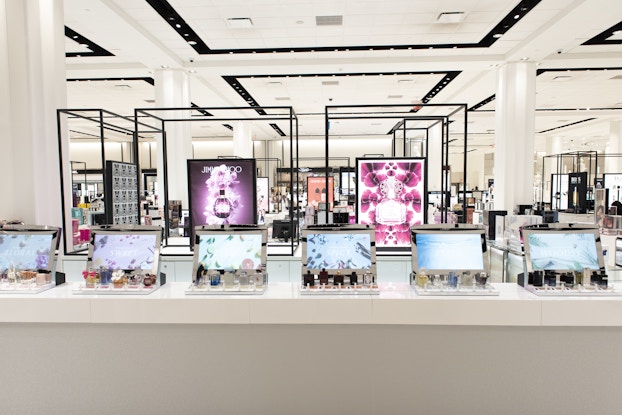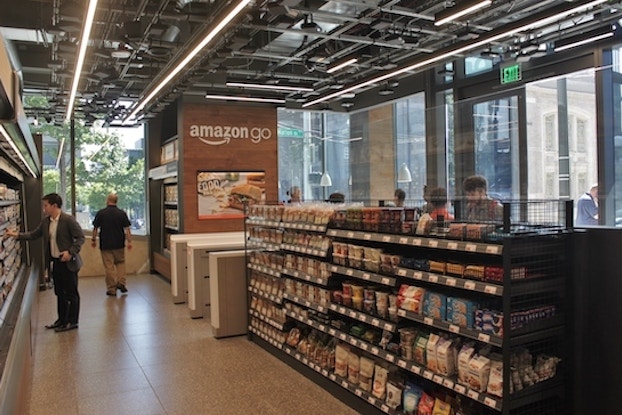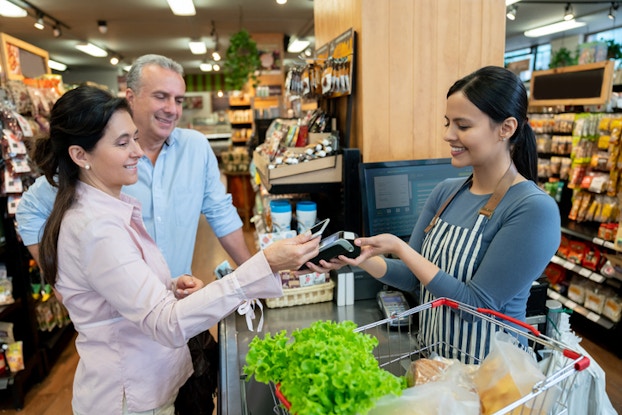
E-commerce may get the bulk of the buzz, but brick-and-mortar still collects 90 cents of every retail dollar spent. Forward-looking retailers are using digital technology to remain relevant. From touch screens to iris scanning, real-world businesses are embracing the possibilities presented by high-tech customer engagement.
Here are four quirky retail trends changing the way you shop.

Macy's interactive fragrance counters
When you know the fragrance you want, buying perfume online is as easy as buying Cheerios. One click and that bottle of Burberry Brit is halfway to your vanity top. Deciding between one scent and another is a different matter. Taking your nose to where the actual scents live might help, but once in the store, which brand’s counter do you visit first? And how do you compare fragrances across a crowded cosmetics department?
Enter the Macy’s Fragrance Bar. These interactive fragrance counters provide a digital in-store experience, combining the convenience of the virtual hunt — searching by scent categories, instant access to product information — with the olfactory perk of a real-world sniff.
The Fragrance Bar allows customers to sample actual fragrances and interact with a digital screen simultaneously. With competing brands placed side by side, the buying experience is similar to that found online. The information the Fragrance Bar collects — what customers pick and how they decide what to buy — can be used to continuously improve the shopping experience.
[Read more: Smells Like Innovation: Macy’s Blends Online and In-Store Experience at Digital Fragrance Bars]

Toys ‘R’ Us experiential retail
Touching the merchandise will definitely be encouraged in the two smaller format stores Toys ‘R’ Us is slated to open this holiday season. Tru Kids, the parent company of Toys ‘R’ Us, is partnering with software-powered retailer b8ta, to create an immersive experience for the entire family.
The companies hope the newly designed experiential spaces, planned for malls in Texas and New Jersey, will be a must-visit destination — a place kids of all ages can play and fall in love with a toy.
B8ta’s “retail-as-a-service” business model gives the store’s vendors with valuable customer data. In-store cameras track foot traffic and dwell time, providing an understanding of how the brick-and-mortar experience leads to online sales.
[Read more: 8 Store Trends Poised to Reshape How You Shop]

Amazon stores, no checkout lines
Cash is no longer king, but time is still money — and time is the only currency consumers spend inside an Amazon Go store. The online behemoth’s foray into cashless brick-and-mortar retail forgoes the carts, cashiers and checkout lines in favor of neat, inviting rows of grocery staples, local artisan food offerings, beverages and meal kits.
The secret sauce is Amazon’s “just walk out” technology. Customers enter through a turnstile with a quick scan of their smartphone’s Amazon Go app and get down to the business of filling a shopping bag. Through a system of cameras, weight sensors and deep learning algorithms, Amazon’s virtual shopping cart tracks what goes in — and out — of the bag. By the time the customer is back on the sidewalk, their credit card has been charged.
If all that artificial intelligence seems impersonal, there are humans in the store stocking shelves, checking ID for alcohol purchases and assisting customers. What they aren’t doing is scanning purchases and re-bagging them while shoppers wait in line. There are no lines because time is — well, you know.
[Read more: Tap, Wave, Go: Cashless Commerce is Coming]

Walgreen's interactive advertising
Some think it’s an ultracool cooler. Some think it’s an invasion of privacy. Whatever your take on the smart coolers being tested at Walgreens, consider them a hint of things to come. The doors — which display a virtual plan-o-gram of perfect, forward-facing products — deliver digital technology to the brick-and-mortar shopping experience on a large scale.
Not displayed on the doors are the cameras, sensors and face detection software that make it all possible. The smart doors — developed and marketed by Cooler Screens — estimate the age and gender of the human peering into the cooler, considering a purchase. Iris-tracking software records exactly what products the consumer eyes up before making a selection. That information, combined with data about the time of day and the weather, can be used by brands to design an ad campaign or assess the efficacy of a current one.
The Cooler Screen also functions as targeted ad space. By deducing what might tempt a middle-aged woman on a hot afternoon, it can offer up that low-fat ice cream promo before she gets the door open. Whether that’s a welcome enhancement to the shopping experience or some slightly creepy mind reading by a refrigerated store fixture is a matter of opinion.
[Read more: 7 Weird Retail Trends That Will Change the Way You Shop]
CO— aims to bring you inspiration from leading respected experts. However, before making any business decision, you should consult a professional who can advise you based on your individual situation.
CO—is committed to helping you start, run and grow your small business. Learn more about the benefits of small business membership in the U.S. Chamber of Commerce, here.







